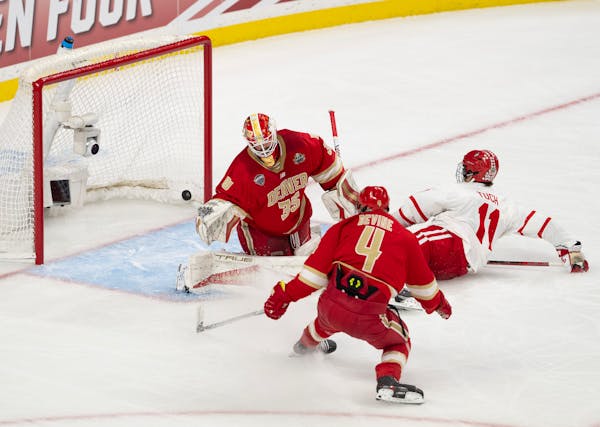For college hockey fans who like their sport peppered with the tenacity of the Bulldogs, the speed and skill of the Gophers, the grittiness of the Huskies, the veteran's guile of the Mavericks and the perseverance of the Beavers, this weekend's NCAA men's Frozen Four at Xcel Energy Center might not have been totally fulfilling.
With no Minnesota team in the Frozen Four for the first time since 2016, a buzz was missing in St. Paul. Though Thursday's semifinals drew 18,598 and Saturday's final attracted 18,694 in creating a festive atmosphere as Denver beat Boston College 2-0 for the national championship, it couldn't match the energy generated by the Gophers' title run in 2022 and Minnesota Duluth's 2011 and 2018 triumphs at the X. Those were signature moments for both programs, and a quartet from Boston, Denver and Ann Arbor would be hard-pressed to stir those types of feelings in a place as proud of its hockey as Minnesota.
The fact that the Gophers didn't make it to St. Paul — and Minnesota Duluth, Minnesota State Mankato, St. Cloud State and Bemidji State didn't make the NCAA tournament — plus the presence of only seven Minnesota natives on the Frozen Four rosters, gave fuel to critics who offered a collective "State of Hockey, my posterior!"
Thing is, when it comes to Minnesota college hockey, the sky isn't falling. Far from it. This postseason was an exception to the recent run of play.
The Gophers were the only Minnesota team to make the NCAA tournament, and that's a rarity. Since the NCAA field expanded to 16 teams in 2003, the only other time Minnesota put just one team in the field was in 2011, when Minnesota Duluth won its first title.
Last year, three Minnesota teams made it, and the Gophers played for the title. In 2022, four made the tournament, two reached the Frozen Four and Minnesota State played for the title. The 2020-21 season was the Minnesota gold standard, as all five teams made the tournament and each won at least one game, with Minnesota Duluth and Minnesota State reaching the national semifinals and St. Cloud State playing for the national title.
Before that, 2019 had three Minnesota tournament teams, including repeat champion UMD. In 2018, three made it, and the Bulldogs claimed their second title in St. Paul. In 2017, UMD and the Gophers made the tourney, and UMD lost in the title game.
Looking toward 2024-25, there's much to like about the Minnesota teams. The Gophers could return 12 NHL draft picks and added a first-rounder, Matthew Wood, through the transfer portal. Minnesota Duluth has a loaded recruiting class coming in, and does anyone expect coach Scott Sandelin, who's hung three NCAA championship banners, not to rebound quickly? At St. Cloud State, coach Brett Larson has taken the Huskies to four NCAA tournaments in five chances. Bemidji State is an annual CCHA title contender, and Minnesota State remains a threat.
The newest Minnesota Division I team, St. Thomas, won't be eligible for the NCAA tournament until the 2026-27 season because of its move from Division III.
When you look under the hood and examine college hockey rosters, Minnesota continues to set the standard. According to research by Jayson Hajdu, director of communications for College Hockey Inc., 2023-24 Division I men's hockey rosters included 233 Minnesota natives. The next closest state was Michigan with 138, followed by Massachusetts (127).
That's par for the course. In 2022-23, Minnesota had 219, with Michigan second at 162 and Massachusetts third at 130. In 2021-22, it was Minnesota 206, Michigan 158, Massachusetts 114. In 2020-21, Minnesota had 205 players, Michigan 148 and Massachusetts 102.
When broken down by players in the NCAA tournament, Minnesota's leadership shows, too. This season, 65 Minnesotans were on NCAA tournament rosters, while New York was second best at 41. In 2022-23, 63 Minnesotans were in the tournament, ahead of second-place Michigan's 51. In 2021-22, 93 Minnesotans made the tournament, with Michigan second at 59. In 2020-21, when five Minnesota teams made the tournament, the state had a whopping 116 players in the field, far outpacing second-place Michigan's 33.
In the Frozen Four, this state had 23 players last year, 33 in 2022 and 44 in 2021. That total fell to seven last weekend, but quality made up for quantity when Bloomington's Tristan Broz scored the overtime winner for Denver in the semifinals and Burnsville's Jared Wright scored the winner in the championship game.
Need more? Last week, USA Hockey selected 23 players to join its National Team Development Program's under-17 team — a feeder program for top college teams. Eight of those players are Minnesotans, and no other state had more than four. Michigan and Massachusetts had one invitee each.
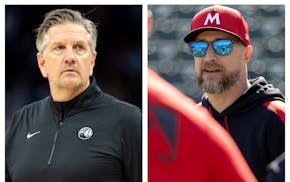
Souhan: Twins' Baldelli and Timberwolves' Finch have a lot in common. They ought to talk.
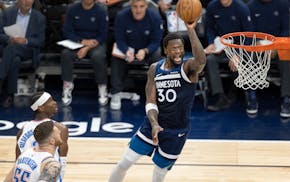
Reusse: A closer study of the Wolves at their absolute best reveals the value of Randle
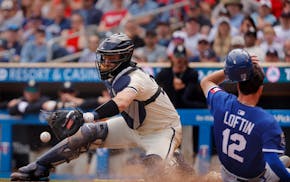
Twins' run of last-inning wins ends when Royals take a turn
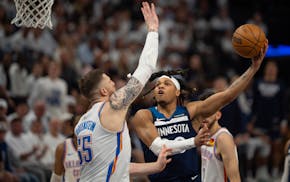
Timberwolves unveil X-factor against Oklahoma City

